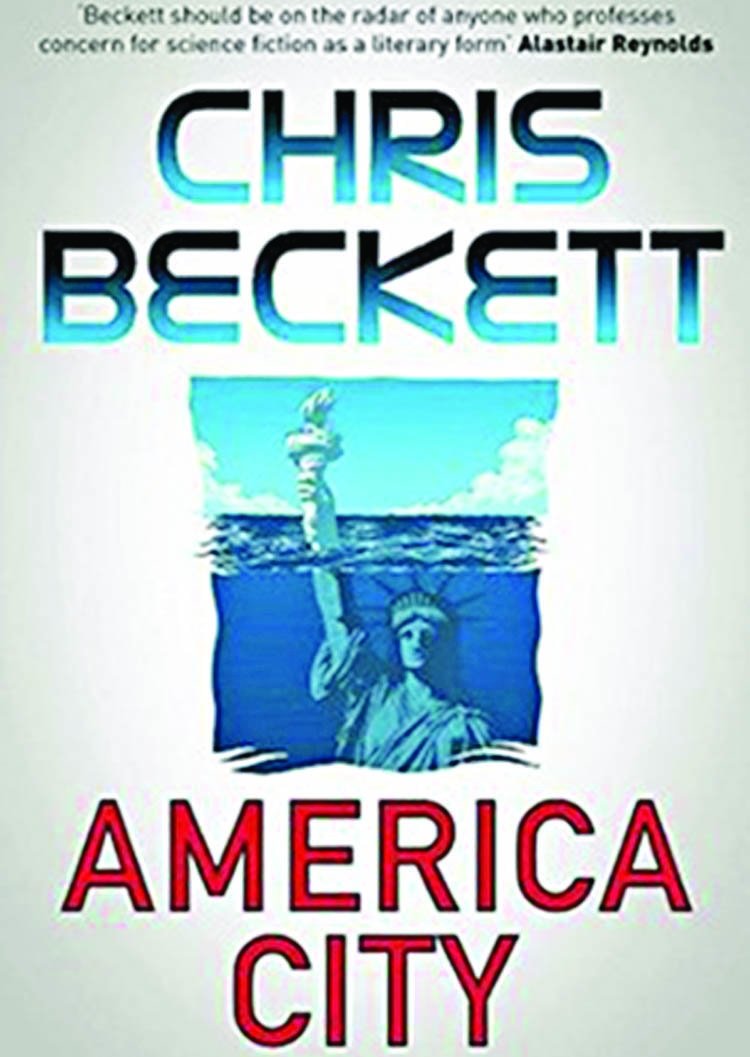Published: 12:50 AM, 12 November 2017
Dark vision of our future
 America City by Chris Beckett, Publisher: Atlantic Books, Publication year: 2017
America City by Chris Beckett, Publisher: Atlantic Books, Publication year: 2017 Liz Jensen explores the dystopia set in a future USravaged by climate change and war, as revealedby the C Clarke winner author
The signposts have been around for decades, and the territory is increasingly well mapped. So while the past may be a foreign country, the future is an increasingly familiar one - in which we continue to be alarmingly ourselves. In this vivid and disturbing climate-change novel, Chris Beckett, winner of the Arthur C Clarke award, compellingly illustrates the consequences of our species' fatal hard-wiring.
Though a knight's move away from his acclaimed sci-fi trilogy Dark Eden, Mother of Eden and Daughter of Eden, his new work shares a preoccupation with the survival and evolution of societies in inhospitable worlds. From the very first page, Beckett depicts Earth as a Frankenstein's monster of a planet in which the disturbed climate functions as both setting and antagonist. In the US, "Big Hydro" has usurped the fossil fuel industry, but the damage is still playing out: it is a nation of vast, rotting forests, choking dust bowls and hurricanes of such extremity that "unprecedented" has become a redundant adjective.
With its weather, shorelines and demographics in flux, the isolationist superpower is split into a rich north and a poor south recovering from a succession of wars triggered back in the Tyranny. (Was the tyranny Trump's? Beckett names no names.) With 40% of the population now Hispanic, por cierto and jesucristo are part of the Anglo lexicon.
The privileged classes are known as delicados, while refugees from the drought belt and the Storm Coast are referred to as barreduras (dirt), "dusties" and "storm trash". Ignorance levels are casually shocking: most citizens have not heard of Abraham Lincoln. Against this backdrop, fake news stories, rumors and opinions - many generated by "silvertongue" AI capable of generating jokes and sophisticated rhetoric - are so deeply embedded in the culture that real facts are mere raw material to be re-tooled, showcased or suppressed for political expediency.
As the novel's British protagonist Holly notes, persuasion operates on "a calculus of dread and comfort … Which way offers, if only fractionally, the higher level of security, the lower level of threat?" As a PR executive, these are the waters in which the ambitious Holly has opted to swim. When she agrees to serve on the presidential campaign of her new boss, the quixotic senator Steven Slay maker, her historian boyfriend Richard and their delicado friends become alarmed at the turn her ambitions are taking.
But as an outsider, Holly shares the blue-collar Slaymaker's disdain for bleeding hearts and hand-wringing. And the attitude is a vote-winner: according to Pollcloud, which Holly can access on the whisper net in micro-seconds, 63% of the population agrees with the statement, "I wouldn't expect the government to help me, so why should I help others?"
Skilled in the manipulation of the masses, Holly also knows how to capitalize on liberal-elite hypocrisies: when addressing an audience of billionaires at a fundraiser, she evokes America as a nation built by people willing to make sacrifices. "This raised a big cheer. Sacrifice was always a moving and uplifting idea, and particularly so if you were not the ones who were going to have to make it."
It's a rare moment of humor in a dark, morally troubling world spent in the company of a protagonist whom Beckett - to his credit - seems to be almost defying us to like or respect. Having watched her parents campaigning fruitlessly for systemic change, Holly is refreshed rather than repelled by Slaymaker's brand of pragmatism, which unashamedly accepts that successful politicians are sharks: if they stop setting the agenda, they die.
Action, right or wrong, soon becomes Holly's guiding imperative too - spawning a brainwave that will have dramatic consequences for the entire North American continent. By the time Beckett's story reaches its dystopian conclusion, the reader is forced, through Holly, to contemplate the choice between dirty but effective action and clamorous passivity. With no obvious third way, Beckett poses the question: is it better to roll up your sleeves and do something - perhaps anything at all - than to observe or avert your gaze?
America City is an uneasy read that manages to feel both timely and urgent. In positing his story as a slice of future history, Beckett's focus is less on the speculative question "what if?" than the more provocative and poignant "what when?" And in setting it within the lifetime of any baby born now, he offers an intelligent, visceral reminder that unless we change what today looks like, tomorrow will be turbulent indeed.
The reviewer is an Englishnovelist.www.theguardian.com
The reviewer is an Englishnovelist.www.theguardian.com




